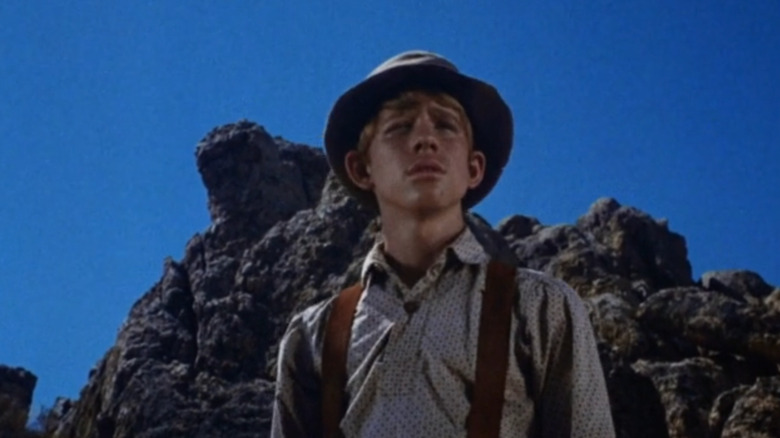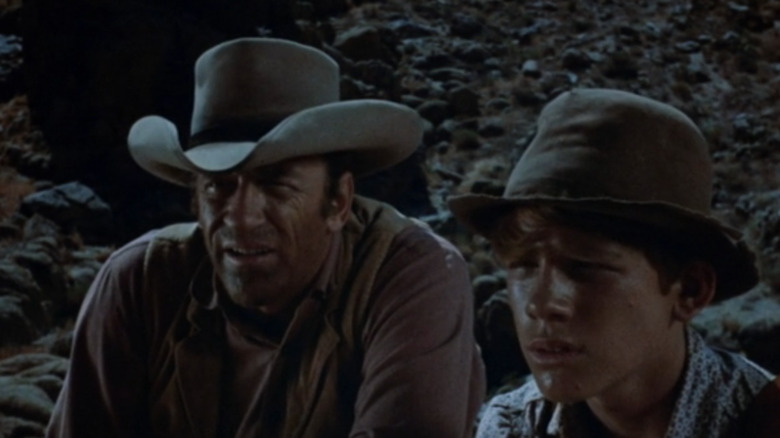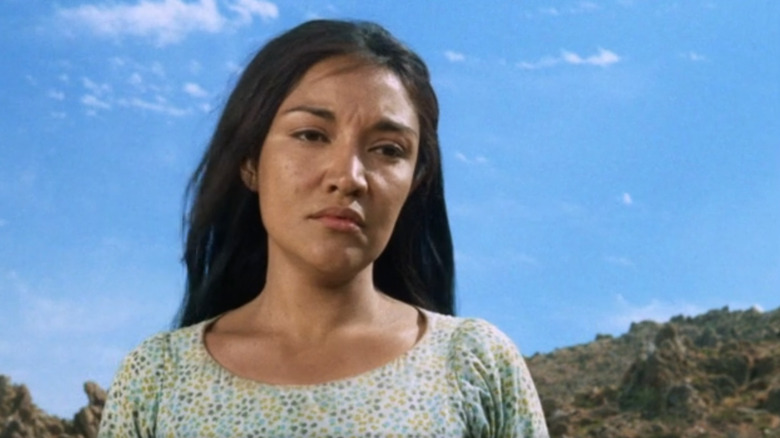The Emmy-Winning Episode Of Gunsmoke That Guest-Starred A Pre-Happy Days Ron Howard
If there are a select number of pillars upholding the Hollywood complex as we know it, Ron Howard is no doubt one of them. He's been an prominent actor, director and producer for over the past six decades and clearly shows no signs of stopping, with his latest film "Eden" set for release next month. Howard's presence as an industry fixture is so prolific each stage of his career is a story unto itself. Long before he became an Academy Award-winning filmmaker ("A Beautiful Mind") or one of the co-founders of Image Entertainment, Howard made a considerable name for himself in the world of television.
In the same vein as Jodie Foster, Howard was thrust into the industry at such a young age and built his legacy on its foundation. Although "The Andy Griffith Show" and "Happy Days" are considered the two landmarks of his television career, you would likely find a bright-face Howard making a guest appearance on just about any popular show of the '60s and '70s. A few notable examples would be programs like "The Twilight Zone," "Route 66," "The Fugitive," "The F.B.I.," "Lassie" and a defining episode of "M*A*S*H," among countless others.
Howard was always flexible working with different genres and was never picky about which ones to narrow in on. When it came to westerns, he popped in for quick visits on big hits like "Cheyenne," "The Big Valley," and "Bonanza." Naturally, if you've encountered Clint Walker and the Cartwright family, it only makes sense to head over to "Gunsmoke" and see what's happening with James Arness' Marshal Matt Dillon.
Usually the guest actors would find themselves flocking to Dodge City for one reason or another, but Howard's episode is a case where the entire conflict takes place outside of it.
Ron Howard plays Jamie, a kid on the run with his adoptive mother
In the season 15 episode, "Charlie Noon," Marshal Dillon is transporting the titular outlaw (James Best) across rocky terrain back to town in order to be hanged. Their journey is interrupted, however, by the discovery of a cabin that's been burned to the ground. It's not exactly uninhabited, as a secret hatch reveals a woman (Miriam Colon) and her stepson Jamie (Ron Howard) hiding out. Two paths suddenly become one as it's revealed the woman (more on her later) is being chased by her former suitor Lone Wolf (Edmund Hashim) and his cavalry of Indigenous Comanche.
Howard plays Jamie rather quietly, with short bursts of anger toward anyone who disrespects his adoptive mother. At this time in his career, the actor was still being credited as "Ronny Howard." It's not a very memorable performance, but that's mostly because the episode isn't really interested in him, but rather the bigoted Charlie. Although Best is most known as the Sheriff on "The Dukes of Hazzard," this isn't the first time he's shared the screen with Howard, having guest starred on an episode ("The Guitar Player") of "The Andy Griffith Show."
What's particularly notable about "Charlie Noon" is that it landed "Gunsmoke" an Emmy in 1970 for Outstanding Achievement in Sound Editing — tying with the one season action-drama "The Immortal." It was the last of the five Emmy wins the long-running CBS western would acquire across its 20 season run. It's about the only thing that makes this episode remotely noteworthy, unfortunately.
Charlie Noon is well-intentioned, but predictably misguided
There's a lot of worth in the world of television westerns, but there's no denying that they were primarily written from a white lens. Shows like "Gunsmoke" were lauded for tackling the boorish nature of racism, but it was never safe from succumbing to its own — lest we remember Leonard Nimoy in unfortunate "redface."
What "Charlie Noon" attempts to do is the time-honored tradition of reforming a racist above all else. We never find out the extent of his crimes except that he killed some people a while back and this is what led him to be executed. A key component of this journey is Colon as the Indigenous Comanche woman who sets the episode's chain of events in motion, but never so much as gets a name or character resolution. She's not really a character, but a vehicle for Charlie to find his purpose in life — and death.
The most glaring indignity is when the woman recounts the story of when she ran away from Lone Wolf. She says that her Comanche name means "not enough to eat," but her chosen husband couldn't pronounce it. "He would not call me by such a name, so he just called me ... woman," she says. It's a pretty disquieting moment where it reveals the levels in which this man denied her personhood, but you certainly wouldn't glean it from the uplifting music underscoring it.
Every episode of "Gunsmoke" is currently streaming on Pluto TV.


